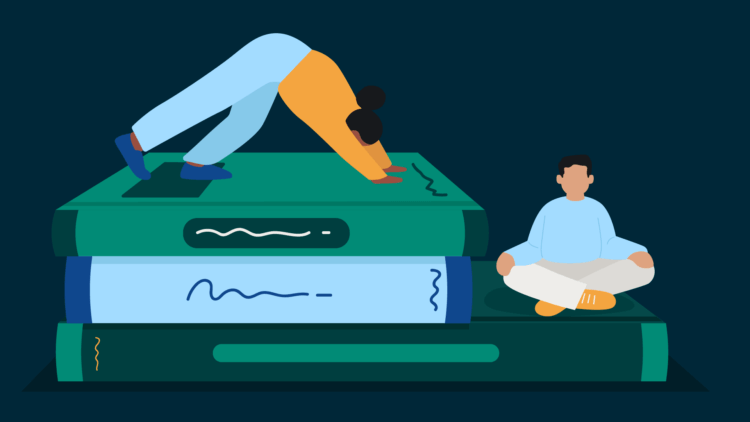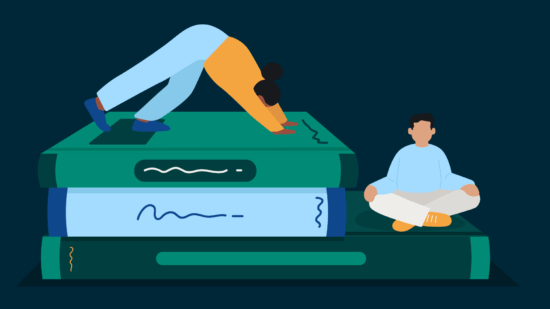Since law school is such a demanding environment, it makes sense to examine the mental toll on law students. Unfortunately, law student mental health statistics paint a somber picture. Statistically, many law students are at risk of suffering from mental health and substance abuse problems. Since practicing attorneys are already prone to poor mental health, it’s not encouraging that the next generation of lawyers is already facing these same challenges.
Here we focus on six law student mental health statistics that highlight the extent of the problem. In addition, we look at how legal professionals can support law students in their quest for better mental wellbeing. As with attorneys, law students can better manage their mental health with the right strategies and support.
1. What percentage of law students are depressed? 40% of law students are depressed after 3 years

According to the Dave Nee Foundation, law school depression rates increase progressively over the course of law school. Prior to entering law school, depression rates among law students are 8-9%. Those rates increase to 27% after one semester, 34% after two semesters, and 40% after three years.
Why are so many law students depressed?
Law school is stressful and competitive by nature, and navigating through the pressures to achieve high class rankings, outperform peers, and land prestigious spots in legal journals can strain law student mental health. In addition, many elements of law school differ from the typical undergraduate experience, such as public speaking, the Socratic teaching method, and a unique style of writing and analysis—which can leave many high-performing students feeling academically unmoored. All of this adds up to psychological distress, which often includes depression.
This tendency toward depression appears to follow many graduates into their practice years. Attorneys are the most frequently depressed occupational group in the US, and attorneys are 3.6 times more likely to suffer from depression than non-attorneys. To solve this problem, the legal industry needs to start with the initial training grounds of legal education.
Subscribe to the blog
How to battle depression in law school
An initial step for law students is to recognize the signs of depression, which share much in common with the signs of lawyer depression. Law school depression signs can include both emotional symptoms, such as lack of joy and a sense of emptiness, and physical symptoms, such as insomnia and chronic fatigue.
Law students can also look to mental health resources such as those provided by the ABA for Law Students.
2. 96% of law students face significant stress, compared to 70% of med students and 43% of grad students
Law school appears to be a uniquely stressful experience compared to other forms of post-graduate schooling. This can be seen by the high levels of reported law school stress. Specifically, 96% of law students suffer from significant stress, compared to only 70% of medical students and 43% of graduate students in all fields. The pandemic likely contributed to this even more.
Why is law school so stressful?
Heavy workloads, high expectations, and constant competition are a recipe for stress. Add in a constant time crunch (and the subsequent lack of sleep that comes with not having enough hours in the day), and it’s clear why law school stress is so pervasive.
Even worse, stress and anxiety continue to dog attorneys throughout their working years. A 2020 study found that roughly half of practicing lawyers are experiencing symptoms of anxiety and depression. Both law students and lawyers require methods of managing stress. While attorneys may be able to save time and minimize stress with the use of technology, students will likely need additional strategies to combat law school anxiety.
Fortunately, there are plenty of healthy ways to deal with law school stress, such as taking short breaks and prioritizing sleep, diet, and exercise. The ABA’s mental health toolkit for law students lists various work-life balance strategies as well, ranging from healthy ways to cope with stress to managing panic attacks. And law students can follow steps to improve mental wellness that work for lawyers, such as adopting healthy mindsets and avoiding multitasking.
You may like these posts
3. 42% of law students in a 2016 study felt they needed mental health counseling, but only half sought it out

A major impediment to law student mental health is the widespread reluctance to seek out professional assistance. A 2016 study by LawyerWellBeing.net found that 42% of law students believed they needed counseling for mental health issues. However, only half of these students sought assistance from a mental health professional.
This trend is more than likely to feed into the stigma surrounding mental health in the legal industry. Although mental illness and substance abuse are prevalent in the profession, oftentimes, lawyers and other legal professionals are afraid to seek help. The common beliefs are that lawyers should simply “suck it up.” Law students might feel pressure to subscribe to this same narrative.
The mental illness stigma must be broken for law students and practicing legal professionals. Fortunately, there are mental health programs and resources provided by law schools, which are becoming increasingly common.
4. Nearly 26.8% of law students in a 2021 study were at risk for alcoholism
With all the mental health challenges faced by law students, it’s no surprise substance abuse is a common issue. A 2021 survey of law student well-being, conducted among 5,400 students at 39 schools, found that nearly 27% of law students were at risk for alcoholism. This correlates with the study’s other findings on alcohol consumption—33% of students reported binge drinking at least once in the prior two weeks, with 16% binge drinking at least twice in that same time period.
Predictably, substance abuse issues carry over when law students graduate and begin practicing. One 2016 study found that approximately 20% of US lawyers engaged in a hazardous level of drinking.
Law students can look for supportive resources pertaining to substance abuse. This includes the national helpline provided by the Substance Abuse and Mental Health Services Administration (SAMHSA), an agency within the U.S. Department of Health and Human Services.
5. 11% of law students reported suicidal thoughts in the prior year
Suicidal ideation is one of the most dangerous aspects of poor mental health, and law school suicide rates are of serious concern. The same study referenced above found that 33% of students reported serious thoughts of suicide in their lifetimes, with 11% reporting suicidal thoughts in the previous year—a notable increase from the 6% rate reported in a similar survey in 2014.
As with other mental health issues, this tendency toward suicidal ideation spills into the legal profession as a whole. Among the occupations with the highest rates of suicide, attorneys rank 5th.
The trend toward suicidal ideation needs to be addressed at the law school level. The suicide prevention resources provided by the U.S. Centers for Disease Control and Prevention (CDC), and the National Suicide Prevention Lifeline are resources law students should utilize.
6. 20-40% of law students have a psychological dysfunction after law school
Another statistic from the Dave Nee Foundation demonstrates the mental health impact on law students over the course of their legal studies. Coming into law school, law students have a psychological profile similar to the general public. But after graduation, 20-40% of these students suffer from a psychological dysfunction.
Unsurprisingly, practicing attorneys exhibit mental health problems as well—with 28% of lawyers suffering from depression, 19% from severe anxiety, and 11% from suicidal thoughts in the previous year. These issues are major contributing factors to lawyer burnout.
Both law students and lawyers can look to various mental health resources, including those discussed above. Law students stand to gain from the same methods used by attorneys dealing with wellness and mental health, including self-management and the practice of mindfulness.
How legal professionals can support law student mental health

While many legal professionals can relate to the struggles of law students, there are ways they can break this cycle of poor mental health. They can help support law students and nurture the mental wellbeing of the next generation of lawyers. The following are a few strategies for doing so.
Become a mentor
Legal professionals can provide direct assistance by becoming mentors to law students. Mentorship provides numerous benefits for law students, including assistance with career goals, job searches, and the business realities of the profession. Not only will this help students with their careers, it will provide the emotional support they need to get through their legal studies in good psychological health.
Search for mentorship programs with your local law school, bar association, or legal organization, such as the California Lawyers Association.
Speak at your old law school
Another option for legal professionals is to speak openly about mental health at your alma mater. This will go a long way toward helping to remove the stigma associated with mental illness, both in law school, the legal industry, and society wide. If public speaking isn’t your forte, consider participating in an interview with the school, which can then be posted on a blog, social media, or a law school publication.
Push for more resources
You can also ask your alumni association or local bar for more mental health resources for law students. For encouragement on this route, look at the recently passed Illinois law on mental health days for students, allowing five excused mental health days per school year for students. If we recognize the need for good mental health among pre-college students, then surely we can see it as vital for law students too.
Final thoughts on law student mental health statistics
It’s important to remember that law student mental health statistics are more than just numbers on a page. These statistics represent law students suffering and sacrificing their mental wellness for the sake of an education. This is why law students and legal professionals need to prioritize their mental health, combat the mental illness stigma, and give society what it truly needs—a legal industry full of well-balanced attorneys with healthy mindsets.
The Legal Trends Report covers a range of statistics relevant to the legal industry, including crucial mental health insights. Download the report here.
Do law students suffer from depression?
Many law students suffer from depression, with a 2021 survey of law students finding that almost a third of the respondents reported being diagnosed for depression at some point in their lives.
Is it normal to feel overwhelmed in law school?
Feeling overwhelmed is common for law students, thanks to the pressure to keep up with heavy workloads and competition from peers. In a 2021 survey of law students, 64% of respondents who were preparing to take the bar exam reported feeling overwhelmed.
Is law school mentally draining?
Trying to succeed in any new environment can be challenging, and trying to succeed under the high-pressure demands of law school can be especially mentally and physically draining. Even law students who are well-suited for the competitive atmosphere can be worn down by long hours spent trying to stay on top of coursework while also striving to set themselves ahead of their peers.
We published this blog post in May 2022. Last updated: .
Categorized in: Clio









